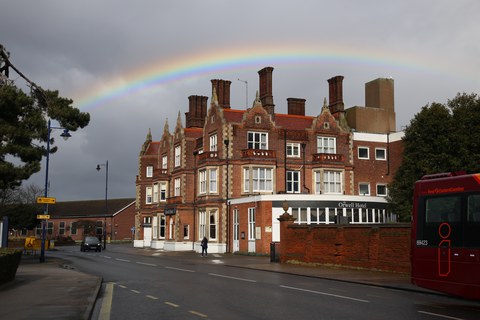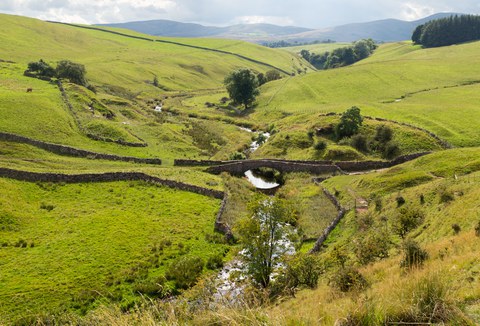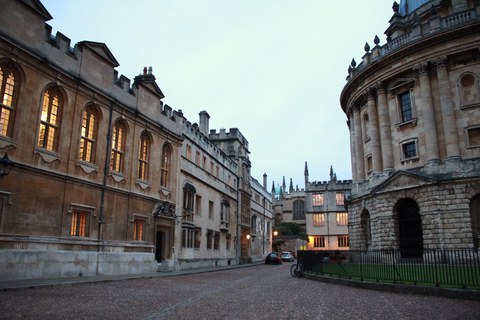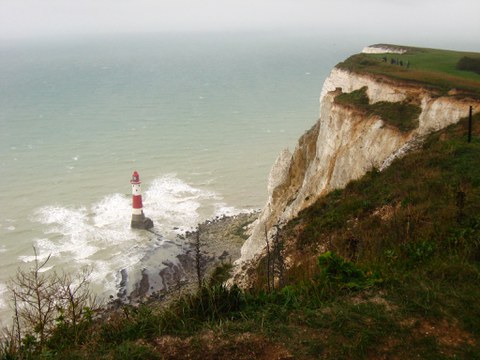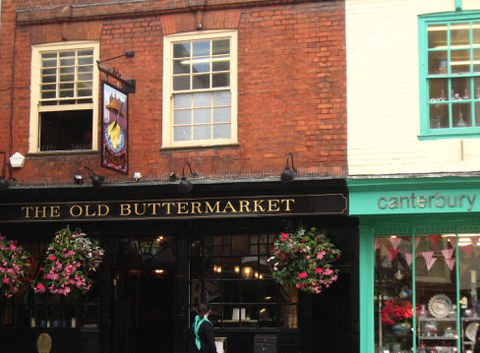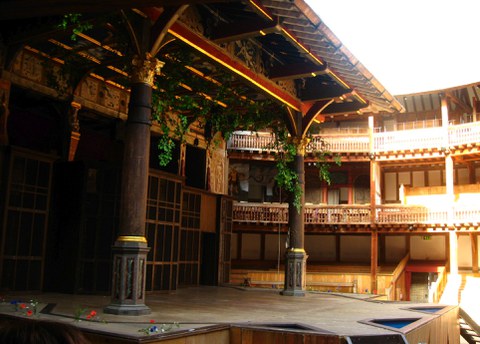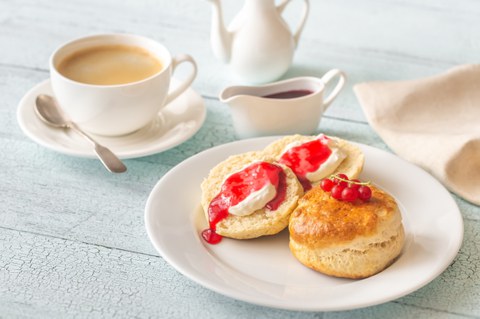Partner Country of the Month June 2025: United Kingdom
Thinking of the United Kingdom, many things come to mind: Quirky British humour, the royal family, rugged Scottish Highlands, medieval towns, and Western Europe's largest city, London. The cultural influence of the United Kingdom is enormous, with famous authors from Shakespeare and Sherlock Holmes to J.R.R. Tolkien. Spending a semester abroad at one of our partner universities in England, Northern Ireland or Scotland is sure to be full of interesting experiences and discoveries.
With the "Partner Country of the Month" campaign, we want to shine a spotlight on the wide diversity of countries, regions and partner universities of TU Dresden that our students can explore during a semester abroad.
Table of contents
General facts and figures about the United Kingdom
Official name: United Kingdom of Great Britain and Northern Ireland (Great Britain is the name of the island on which Wales, Scotland and England are located)
Capital: London
Population: 68 million (2023)
Official language: English; regionally also Cornish, Welsh, Scots, Scottish Gaelic, Irish & Ulster Scots
Currency: Pound sterling (£ / GBP)
You can find further facts, figures and information on Wikipedia or on the website of the German Federal Foreign office. For travel info, see wikivoyage and visitbritain.com.
Language matters
Outside the UK, British English is often equated with Received Pronunciation, the Standard English of the British monarchy. Regionally, RP originates from the south-east of England, and it is often associated with higher education. However, there are many local dialects in the UK, and their public reputation is on the rise.
A special regional curiosity of British English is Cockney rhyming slang, invented by long-established Londoners. In rhyming slang a word (e.g. telephone) is replaced with a rhyming phrase (dog and bone). The second word can usually be omitted, so ‘I'm on the phone’ becomes ‘I'm on the dog.’ Rhyming slang may have been an actual secret language in the past, but today it's mostly a play on words. Fancy a few more examples?
- face = boat race = boat
- stairs = apples and pears = apples. „He’s gone down the apples.“
- feet = plates of meat = plates. „My plates hurt!“
- lies = porky pies = porkies „Don’t tell porkies!“
- money = bread and honey = bread
- head = loaf of bread = loaf. „Use yer loaf!“
To get back to more solemn facts: When counting both native (about 25%) and second language speakers (about 75%), English is the most widely spoken language in the world. It has become the lingua franca of international science and business, not to mention the internet and with it, pop culture. Improving your English during a semester abroad in the United Kingdom is sure to bring you many advantages.
Please check the language proficiency requirements of your partner university of choice before applying. If needed, you can join the preparation course for a period abroad at TUDIAS to brush up your English.
Did you know that ....?
- fish and chip shops like to play on words, not unlike German hairdressing salons? Fancy a snack from ‘Frying Nemo’, ‘Oh my Cod’ or ‘Jack the Chipper’?
- in Wales, a mischievous ghostly horse brings luck for the new year? Between Christmas and New Year, the Mari Lwyd – a horse skull with glowing eyes and a colourful mane of ribbons – goes from door to door. The Mari and her gang ask for admission in a battle of rhymes, and when the residents invariably run out of answers, they must be let in and provided with ale. Once inside, the Mari’s shenanigans are said to scare away the misfortunes of the old year.
-
our partner city Coventry sponsored the tower cross for Dresden’s Frauenkirche? Both cities were heavily destroyed during the Second World War and, in the name of peace and reconciliation, established a partnership in the 1950s. The mutual exchange is still ongoing and includes an Erasmus+ exchange cooperation between TUD and Coventry’s University of Warwick.
-
Oxford and Cambridge are among the world’s oldest universities in continuous operation, surpassed only by the University of Bologna? Moreover, for about 800 years (until 1832), no other universities existed in the UK – so it’s no surprise that Oxbridge can count the most prominent figures of science and literature among their alumni, such as Isaac Newton, Oscar Wilde and Charles Darwin. The long history of the prestigious universities is also reflected in splendid medieval architecture, and sometimes in old grudges.
-
by royal decree, the Tower of London must always be inhabited by ravens? According to legend, the British Monarchy will fall when the ravens leave the castle. On hearing this, 17th century King Charles II decided to take no chances. Since then, a minimum of six ravens have always lived on the castle grounds. They can stroll about at their leisure, delight on making mischief with tourists, and are taken care of by the Ravenmaster.
-
a toasted slice of bread between two untoasted ones is a legitimate form of sandwich in the UK? To save the reputation of British food: The so-called toast sandwich was created as food for the sick. Other odd sarnies have managed to gain broader popularity, like the crisp sandwich, the fish finger sandwich, and the chip butty (whose perfect bread-to-chip ratio has been the subject of a scientific study).
-
making faces is a competitive sport in the UK? The goal is to create the biggest possible facial transformation. Professional gurning is not for the faint of heart. The best gurners can even pull their lower lip up above their entire noses (easier to do without teeth). Another odd British competition is the famous Cheese Rolling of Gloucestershire, where participants chase a wheel of cheese down a steep hill (and often end up rolling themselves). The cheese reaches speeds of 110 kilometres per hour.
Cooperations with Universities in the United Kingdom
You can find all cooperations of TU Dresden in our database. Have a look at the experiences of our previous exchange students at Questionnaires. Professors at your faculty may have direct contacts to your partner university of choice and can advise you.
Cooperations via Erasmus+
- About Erasmus+
- University of Aberdeen in Scotland
- Mechanical Engineering (faculty)
- Aberdeen, Scotland’s third-largest city after Glasgow and Edinburgh, is located on the eastern coast. Our partner university played an important role in Scottish history and is one of the oldest universities in the anglophone world.
- Queen's University Belfast in Northern Ireland
- International Relations
- Belfast, capital of Northern Ireland, is known for Irish music, the checkered history of The Troubles, and as the launch site of the Titanic. Former exchange students liked the teaching style and the focus in security policy offered by our partner university.
- De Montfort University in Leicester, England
- International Relations
- Leicester (pronounced Lester) lies in the East Midlands, close to Birmingham and Coventry, and can look back on an exceptionally long history. Today, it is diverse and multicultural. Our partner university is famous for art and design.
- Loughborough University in England
- Physics
- Electrical Engineering and Information Technology
- Mechanical Engineering (faculty)
- Civil Engineering
- Transport Engineering
- Loughborough is an East Midlands town centred around its university and industry. Our partner university is known for excellence in engineering and sports. Former exchange students liked the the lively campus societies and the wide range of support offered by the university.
Cooperation via TUDworldwide
- The University of Warwick in Coventry, England
- Interdisciplinary cooperation
- After successfully completing your application process via TUDworldwide and gaining your spot, you can apply for funding via Erasmus+.
- No other city lies as close to England’s geographical centre as Coventry, making it a perfect starting point for discovering the country. Former exchange students liked the excellent academic support, small courses, and vivacious campus life at our partner university.
- King’s College London in England
- Medicine
- As Western Europe‘s largest city and capital of the UK, London is a bustling hub of art, culture, science, and commerce. Our partner university is one of the largest and most financially well-endowed universities of the country, and known for excellent research and teaching in the health sciences.
Don't miss...
London's fascinating museums. London is bursting with culture, including an extraordinary array of first-class museums. The biggest and most famous ones are British national museums, meaning that visits are free of charge. These include the Victoria & Albert Museum, the world's largest museum of applied art and design. It is also the birthplace of the museum café – of course, the V&A’s cafés are lavishly decorated. The Science Museum covers topics as diverse as space exploration, the generation of energy and the history of the Industrial Revolution, which began in 18th century England. If these topics are not for you, how about the Natural History Museum, the British Library Treasures Gallery, and many others? Alongside the big museums, many small curiosities are also worth a look.
Cliffside hiking. There are many wonderful starting points for a cliffside hikes in the United Kingdom. Close to London, the bright white chalk cliffs of the South Downs can be explored on a circular walk that starts at the coastal town of Eastborne. Don’t miss Beachy Head with its picture-book lighthouse. Close to our Scottish partner city Aberdeen, a hiking trail starts at the small town of Stonehaven, leading to the picturesque ruins of Dunnottar castle perched on rugged cliffs.
Visit a Victorian pub. British pubs are known for their rustic wooden furnishings, carpets and cosiness. Pubs (short for public house) serve ales and beers as well as pies and other hearty pub food. Reason enough for a visit! Your experience can be even more special if you visit one of the pubs that still boast furnishings from the Victorian era. When having a pint at the Crown Liquor Saloon in Belfast, you can admire the original mosaic floors and carvings, and at The Champion in London, the stained glass windows tell the stories of 19th century heroes.
Shakespeare’s Globe Theatre. The original Globe theatre where Shakespeare created his plays has long since burnt down. However, the three-storey half-timbered building that now bears its name is a faithful reconstruction. It even includes the only thatched roof in all of London – an exception to a ban that was put in place when London burned down in 1666. At the Globe theatre, first-class actors regularly perform Shakespeare‘s plays. As the most impotant poet of the English language, Shakespeare's influence was not only literary. He also contributed to the standardisation of written English and is said to have invented thousands of words and phrases. You can find out about this and much more at the visitor centre.
Let's get cooking...
The reputation of British cuisine is not particularly good... but did you know that it used to be the opposite? In the 19th century, cooking à l'anglaise (the English way) was synonymous with top-class cuisine, as the British upper classes could afford skilled servants and ingredients from all over the world. This came to an end when the British colonial empire collapsed. However, British cuisine has since recovered. The internationalisation of the United Kingdom contributed to a diverse and interesting food culture. Today (in addition to fish'n'chips) British-Indian chicken tikka masala is considered a national dish.
Some foods, such as sandwiches, are popular throughout the United Kingdom. However, its individual countries have their own food culture and dishes as well. Scotland is known for haggis and buttery shortbread, England for Yorkshire pudding and Sunday roast, Wales for a very special cheese toast, and Ireland for savoury Irish stew. The specialty of Cornwall is the Cornish Pasty, a type of dumpling that used to be a practical packed lunch for miners.
Afternoon Tea with Scones
What could be more British than having tea around 4 or 5 pm? While tea also refers to herbal and fruit infusions in Germany, British tea is always brewed from real tea leaves. The most popular kind of tea in the UK is black tea with milk.
Not every tea in the afternoon can be called afternoon tea. Afternoon tea is a luxurious affair, where tea is served together with an etagere of delicacies including finger sandwiches, scones and chocolates. Cream tea is the everyday version. It consists of tea and scones – small, preferably freshly prepared sweet rolls. They are typically topped with clotted cream and jam, although the order of the spreads is a hotly debated topic. You can find a recipe for scones here. You might have to replace some ingredients: Adding 1 teaspoon of baking powder per 100 g of flour creates self-raising flour. Clotted cream can be substituted with mascarpone.
Contact
Have you had a great time in the United Kingdom? Do you have tips for places and experiences that are not to be missed? We would be happy to share your experiences here, on social media or, if you want, in information events for other TUD students. Get in touch with us:
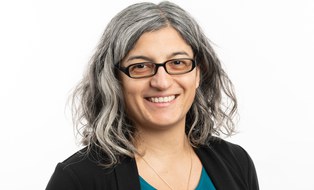 © Sven Ellger/TUD
© Sven Ellger/TUD
Advice on studying abroad
NameMs Federica Serra
Infocenter/ Study abroad; TUDworldwide: America
Send encrypted email via the SecureMail portal (for TUD external users only).
Visiting address:
Fritz Foerster Bau, Office 161 Mommsenstraße 6
01069 Dresden
Postal address:
TUD Dresden University of Technology International Office
01062 Dresden
Office hours:
- Tuesday:
- 09:30 - 11:30
- 12:30 - 14:30
- Thursday:
- 09:30 - 11:30
Please register at the SCS (FOE, floor 0).
Looking for first-hand information?
Would you like to know more about the United Kingdom? Ask our alumni ambassadors - TUD alumni who are active in many countries around the world and can give you information and advice for your stay abroad.
Getting in touch is very easy: On this interactive world map, markers indicate the cities where our alumni ambassadors live. There is a short profile with contact information for each ambassador.
Partner Countries Archive
Have you missed a partner country? No worries! Here you can read up on all articles.
|
Europe (Erasmus+) |
|
|
Africa |
|
|
America |
|
|
Asia |
|
|
Australia and Oceania |
|

